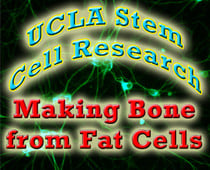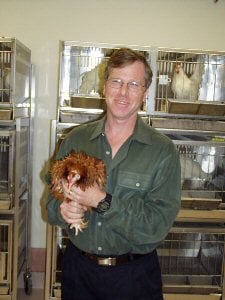 In 2002, entertainment mogul David Geffen gave an unrestricted gift of $200M to the University of Calfornia Los Angeles' School of Medicine, which was subsequently named the David Geffen School of Medicine (DGSOM) in recognition of his generosity. Now, Mr. Geffen has made a further gift of $100M to establish a medical scholarship fund that will offer full funding to the most qualified and promising medical students, whether they are pursuing the MD degree or the MD/PhD in UCLA's renowned Medical Scientist Training Program. As the aim of the scholarship program is to recruit the best students in the world to DGSOM, both American and international students are eligible. All costs including living expenses and supplies are covered by the award and are offered for all 4 years (or 8 in the combined MD/PhD scientist program).
In 2002, entertainment mogul David Geffen gave an unrestricted gift of $200M to the University of Calfornia Los Angeles' School of Medicine, which was subsequently named the David Geffen School of Medicine (DGSOM) in recognition of his generosity. Now, Mr. Geffen has made a further gift of $100M to establish a medical scholarship fund that will offer full funding to the most qualified and promising medical students, whether they are pursuing the MD degree or the MD/PhD in UCLA's renowned Medical Scientist Training Program. As the aim of the scholarship program is to recruit the best students in the world to DGSOM, both American and international students are eligible. All costs including living expenses and supplies are covered by the award and are offered for all 4 years (or 8 in the combined MD/PhD scientist program).
Tags: CA, University of California Los Angeles, California, 2012, Los Angeles, Funding, UCLA, Biotechnology Vendor Showcase, medical school, charitable giving
The University of California system has five biomedical campuses currently: San Francisco, San Diego, Los Angeles, Irvine, and Davis/Sacramento. While each campus maintains a certain autonomy, the advantage to being part of a unified, statewide system is especially apparent when it comes to sharing resources such as biospecimens. In research studies that require data from large numbers of human blood or tissue samples, for instance, scientists rely on biobanks: an organized collection of human biological material and associated information stored for one or more research purposes.
Tags: CA, University of California Los Angeles, University of California San Francisco, Bioscience research, Bioresearch, Translational Research, Southwest, California, University of California, 2012, Los Angeles, San Diego, San Francisco, BioResearch Product Faire Event, Biotechnology Vendor Showcase
When a catastrophic natural disaster strikes, first responders often make the difference between life and death for potential victims. Training, preparedness and valor play a part in successful rescue efforts, but so do good tools. Sometimes that tool is as basic as an axe or a flashlight, or a life vest or life raft. The recent mega-storm in the NE has us thinking about the kinds of tools that science research is coming up with to address emergency and crisis situations, both during and in the aftermath of a major event. To that end, we're taking a look back today at some of our earlier blogs on life science research invention to see what kinds of scientific solutions are on the horizon (or already here) to aid in disaster relief and recovery efforts.
Tags: UW, Ozcan Nano/Bio Photonics Lab, University of Washington, WSU, University of Minnesota Twin Cities, 2012, Los Angeles, Colorado State University Fort Collins, BioResearch Product Faire Event, UCLA, Front Line event, Seattle, Biotechnology Vendor Showcase, Colorado, St.Paul, scientist solutions, CSUFC, disaster relief
 The big, shiny black solar panels you're used to seeing bolted onto south-facing rooftops may soon be obsolete, if researchers at UCLA's California NanoSystems Institute continue to advance solar nanoscience at their current lightspeed pace. In fact, you not only won't recognize the new technology, you won't even be able to see it -- because it will be virtually transparent. And instead of being mounted to the roof, these thin plastic flexible sheets will cover your windows and skylights, as well as smaller surfaces like the face of your smartphone or tablet. What if the sun's not shining brightly? No problem, because these polymer solar cells (PSCs) absorb mostly ultra-violet and near-infrared (NIR) light, rather than the visible light that more traditional solar technology relies upon.
The big, shiny black solar panels you're used to seeing bolted onto south-facing rooftops may soon be obsolete, if researchers at UCLA's California NanoSystems Institute continue to advance solar nanoscience at their current lightspeed pace. In fact, you not only won't recognize the new technology, you won't even be able to see it -- because it will be virtually transparent. And instead of being mounted to the roof, these thin plastic flexible sheets will cover your windows and skylights, as well as smaller surfaces like the face of your smartphone or tablet. What if the sun's not shining brightly? No problem, because these polymer solar cells (PSCs) absorb mostly ultra-violet and near-infrared (NIR) light, rather than the visible light that more traditional solar technology relies upon.
Tags: CA, University of California Los Angeles, Photonics, Solar Energy, nanotechnology, California, 2012, Los Angeles, Biochemistry, Engineering, UCLA, scientists solutions, Biotechnology Vendor Showcase, Photonic Devices, scientist solutions
Anyone who's ever pulled an all-nighter to finish a project knows how it wreaks havoc with your metabolism. The fact is, it's not just a nicety to be awake and active during the day and sleep at night: it's the way bodies are hard-wired. Scientists have long-suspected that upsets in a person's biological clock could play a factor in the development of metabolic disorders like diabetes. Now a team of researchers from three Southern California universities has made surprising discoveries that support that hypothesis. Not only have they isolated the protein that regulates the biologic clock (and named it cryptochrome), but they have found a molecule called KL001 that dictates when cryptochrome gets sent to the proteasome recycling bin. Which is to say, they now know a lot more about this complex circadian system that not only tells the body when to sleep and wake, but also how the body should manage glucose levels in those periods of relative activity and dormancy. The bio research study was published in the July 13 advance online issue of the journal Science.
Tags: CA, University of California San Diego, University of Southern California, Diabetes, Southwest, California, 2012, University of California Santa Barbara, USC, Los Angeles, Biochemistry, Scripps, biology research, bio research, Front Line event, NSF
A vital part of academic research is networking, and one of the ways researchers share their work is at professional conferences. Universities and departments sponsor these conferences where groundbreaking papers are given (usually long before publishing) and colleagues from around the world share insights. The University of California Los Angeles has world-class scientists and other thinkers in its ranks, and Los Angeles seems a natural hub for gathering great minds for this important mode of networking. Unfortunately, UCLA has lacked meeting facilities on par with the caliber of its faculty and research labs. That is about to be remedied, thanks to a commitment by the UC Regents and a generous donor pledge to build a new conference center with a 250-bed hotel right on campus and near existing facilities. According to UCLA Chancellor Gene Block:
Tags: CA, University of California Los Angeles, California, 2012, Los Angeles, UCLA, Conference, Event, Biotechnology Vendor Showcase, new construction, Exhibit space, Event Company
 Bone marrow was the first stem cell source to be widely used in clinical transplant surgery to replace damaged bone as a result of injury or chemotherapy. Unfortunately, bone marrow grafts are painful, and the appropriate donor is not always available when the need is there. Now research at the University of California Los Angeles' Broad Center of Regenerative Medicine has demonstrated successfully that stem cells from the patient's own fat (i.e. adipose tissue) can be made usable for bone damage treatment. Bone marrow is, after all, the soft, fatty tissue inside your bones that contains immature cells (aka stem cells) that give rise to all of your blood cells. So looking to fatty tissue from another part of the body to produce mesenchymal cells has made sense all along, though it has taken the efforts of several UCLA teams to show how it can be done in an animal model.
Bone marrow was the first stem cell source to be widely used in clinical transplant surgery to replace damaged bone as a result of injury or chemotherapy. Unfortunately, bone marrow grafts are painful, and the appropriate donor is not always available when the need is there. Now research at the University of California Los Angeles' Broad Center of Regenerative Medicine has demonstrated successfully that stem cells from the patient's own fat (i.e. adipose tissue) can be made usable for bone damage treatment. Bone marrow is, after all, the soft, fatty tissue inside your bones that contains immature cells (aka stem cells) that give rise to all of your blood cells. So looking to fatty tissue from another part of the body to produce mesenchymal cells has made sense all along, though it has taken the efforts of several UCLA teams to show how it can be done in an animal model.
Tags: University of California Los Angeles, Stem cell research, cancer research, Southwest, California, Los Angeles, UCLA, Research, Stem Cell, Biotechnology Vendor Showcase, BVS, science solution
 The University of Southern California has a thriving regenerative medicine research headquarters at the Broad Center within the Keck School of Medicine. Established in 2006, the Center's $80M state-of-the-art building opened in 2010 to house eleven research teams and four core laboratories. In addition to seeking out therapeutics, though, a team of USC stem cell scientists is marrying their study of stem cell functioning to a more thorough understanding of regenerative biology as it happens naturally in many species of animal. Drs. Cheng-Ming Chuong, Randall B. Widelitz (right), Ping Wu, and Ting-Xin Jiang of the Department of Pathology discuss their lab research, which looks at stem cells in hair and feathers in particular, in a recent article published in the journal Physiology.
The University of Southern California has a thriving regenerative medicine research headquarters at the Broad Center within the Keck School of Medicine. Established in 2006, the Center's $80M state-of-the-art building opened in 2010 to house eleven research teams and four core laboratories. In addition to seeking out therapeutics, though, a team of USC stem cell scientists is marrying their study of stem cell functioning to a more thorough understanding of regenerative biology as it happens naturally in many species of animal. Drs. Cheng-Ming Chuong, Randall B. Widelitz (right), Ping Wu, and Ting-Xin Jiang of the Department of Pathology discuss their lab research, which looks at stem cells in hair and feathers in particular, in a recent article published in the journal Physiology.
Tags: University of Southern California, Stem cell research, USC Science, Southwest, California, Los Angeles, animal science, biology research, Front Line event
Tags: University of California Los Angeles, Medical Device Technology, Ozcan Nano/Bio Photonics Lab, crowdsourcing, Microscopy, Lab-on-a-chip Technology, Southwest, Los Angeles, UCLA, innovative solution, Biotechnology Vendor Showcase, BVS
The 29th Semiannual Los Angeles Biotechnology Vendor Showase™ Event (BVS) at UCLA on April 5th, 2012 was a success with close to 600 researchers looking at a wide variety of new products. Attendees had the opportunity to investigate the latest technology, enjoy a free catered lunch, and take fun Science Ninja photos!
Tags: CA, University of California Los Angeles, vendor shows, Southwest, California, University of California, Los Angeles, UCLA, Biotechnology Vendor Fair, Ucla Connection Opportunity, Biotechnology, California Research Conference, california research seminar, life science researcher event, Life Science Technology, laboratory sales

